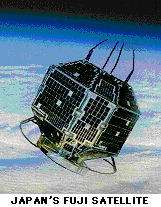|
Japanese hams had a replacement satellite ready three months after their first had to be turned off in 1989 for lack of electricity.
Their first hamsat had been called Japan Amateur Satellite (JAS-1a) and Fuji-OSCAR-12. Fuji is Japanese for wisteria. The replacement was labeled JAS-1b and called Fuji-OSCAR-20.
 JAS-1b was the seventh hamsat hurled to space in 1990. Just 16 days after the European Space Agency launched the microsats, an H-1 rocket provided by Japan's National Space Development Agency ferried the 110-lb. JAS-1b to a 750-mi.-high orbit February 7. The H-1 also carried two government satellites, MOS-1b and Debut. It was the first time Japan had launched more than two satellites at one time.
JAS-1b was the seventh hamsat hurled to space in 1990. Just 16 days after the European Space Agency launched the microsats, an H-1 rocket provided by Japan's National Space Development Agency ferried the 110-lb. JAS-1b to a 750-mi.-high orbit February 7. The H-1 also carried two government satellites, MOS-1b and Debut. It was the first time Japan had launched more than two satellites at one time.
Eclipses kept FO-12 from producing enough electricity, but FO-20 was in a more favorable orbit without as many periods of solar eclipse.
FO-20 uses torque generated by interaction of two permanent magnets with Earth's magnetic field to maintain its attitude.
FO-20 receives and retransmits voice and Morse code, permitting hams to chat over wide areas of the globe. It also provides an electronic mailbox, storing messages in 1.5 megabyte random-access memory (RAM) and delivering them on request to other stations at later times. Amateurs on one side of the world place messages on the satellite's electronic bulletin board to be read by others when the hamsat is on the far side of the globe.
The communications uplink is near 145 MHz. The downlink is near 435 MHz. Telemetry is in Morse code and packet radio near 435 MHz.
| PREVIOUS PAGE The 1990s |
NEXT PAGE The 2000s |
| Satellites | Search STO | STO cover | K3RXK | Questions | Feedback | Suggestions | ||||||||
| © 2005 Space Today Online | ||||||||||||||